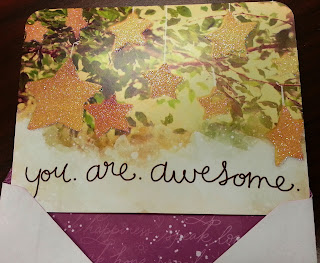 |
| Show your appreciation |
Too often, we allow this tunnel-vision to interrupt our collegial relationships and can lead to us taking advantage of our peers and taking our staff for granted.
There are easy ways to step outside of your own congested mind to say a few kind words of appreciation. Here are some general tips to help communicate the appreciation that can, sometimes, become buried under our task lists.
Tell others about their strengths. Just hearing, "you're really good with the students." Or, "It is clear you love advising--and you're very clear with the advisees." Small things like, "Fixing the copier saved the day, thanks!" can go a long way when someone is having a stressful or busy day.
Say "thank you" every single time something gets done. No exceptions. No matter how trivial, work this phrase into your every day jargon. Your administrative assistant returns pressing phone calls (saving you valuable time), then simply thank him or her. Don't brush it off. Show him/her that it means something to you. The "thank you" culture will catch on and appreciation becomes easier to show.
Break down large projects into small tasks. No one likes to be overwhelmed (and as faculty or administrators, we know how it feels to be overwhelmed!). Avoid dumping huge projects on those around you. Instead, reach out with clear plans, consistent vision, and manageable tasks to ease the burden of a huge project.
Check in often. Ask "what do you like about the work we've been doing?" Or, "what could we improve?" Put your ego in check and LISTEN when others are commenting on their work day -- what may seem like a small detail (a parking space, for example) for someone can easily make every day start out in the "crummy" column. My mantra: "Ask. Listen. Consider. Communicate. Act."
Go beyond work conversation. You do not have to be Besties with everyone at work, but a simple conversation about a colleague's family or a follow up on their on-going car problems can show that you care and value them beyond the work they are doing.
 |
| Easy steps to being thankful: Keep cards on hand |
Keep cards on hand. These little thank you notes can make someone smile -- and are particularly poignant when big projects are completed. My desk drawer always has notes and little items to help make a rough day easier or to help show others I appreciate what they do.
Post a quote. Instead of a sticky note of tasks for someone, leave a powerful quote or a kind word in a highly visible color. They won't expect that little note and some encouragement can kick-start our days.
If you feed them...Yes, bring in a little food, sweets, or fun. It might be a new flavored coffee or a simple donuts run, but sharing food breaks down walls, opens communication lines, and can perk up someone wilting under pressure.
Send an email. It is easy to threaten to write a note when services are terrible--but how often do we write a note when services are fabulous? I did this the other day and received amazing feedback from the supervisor of the staff member who effusively thanked me for going out of my way to comment on an employee who was doing good work.
 |
| A note of appreciation sent this week |
Thank those who help in front of others. Recognize them. Show how you value them beyond your own office or department.
With moments a day, you can create a culture that values appreciation and shares recognition.
What steps do you take to communicate appreciation in your workplace?
Don't forget, you can "like" Communication and Higher Education Blog on Facebook:http://www.facebook.com/CommHigherEdBlog





